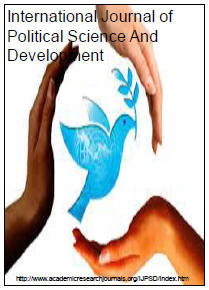| IJPSD |
International
Journal of Political Science and Development |
|||||||||||||||||||||
|
International Journal of Political Science and Development Vol. 3(7), pp. 339, July, 2015. DOI: 10.14662/IJPSD2015.041 ISSN: 2360-784X
Book Review
Trust: The Social Virtues and
the Creation of Prosperity
The author examines
the common characteristics of the trust in family centered societies
that, the family based companies are usually small and inefficient in
the community. In the attempt to find an explanation to that argument,
he uses to compare the China’s family based companies are small because
of low trust inside of the society. For the author, the low trust may
occur disadvantages like corruption and inefficient organisations.
Lastly, according to
the author, those societies with a high predictive stability are able to
integrate and modernise fast through scientific and especially
technological advances in their companies or organisations. He has
described that the cultural values and procedures have a deep influence
on the ability of a society to become efficient in the sense of
predictive stability in the long term. Then he continues that, the
societies may survive for a long time also without being efficient.
China’s case could
be limited if we are not going to generalize the family based societies’
characteristic aspects. However, there are too many examples for family
centered companies or organisations in the whole world. We could not
come up with the general conclusion to all family centered companies of
different communities. China society could be unsuccessful case but, in
terms of different companies, for example, Turkish family based
companies are different and really successful in their development. In
Turkey, the number of family based companies and organisations try to
save their development and function through new technologies and
professionals in the field.
On the second
explanation about the predictive stability, the author sees the ability
of predictive stability in inefficient societies. Then he argues with
the opponent thought that, even inefficient societies may live long.
There is no doubt that, the author through this book has been able to
address the comparison of detailed points, that how inefficient
societies could survive for a long period of time, what are the main
advantages or disadvantages of being inefficient society in this way.
The author explained the efficiency of predictive stability skilled
societies as successful communities in a long term rather explaining how
inefficient societies could live long.
|
|
||||||||||||||||||||
